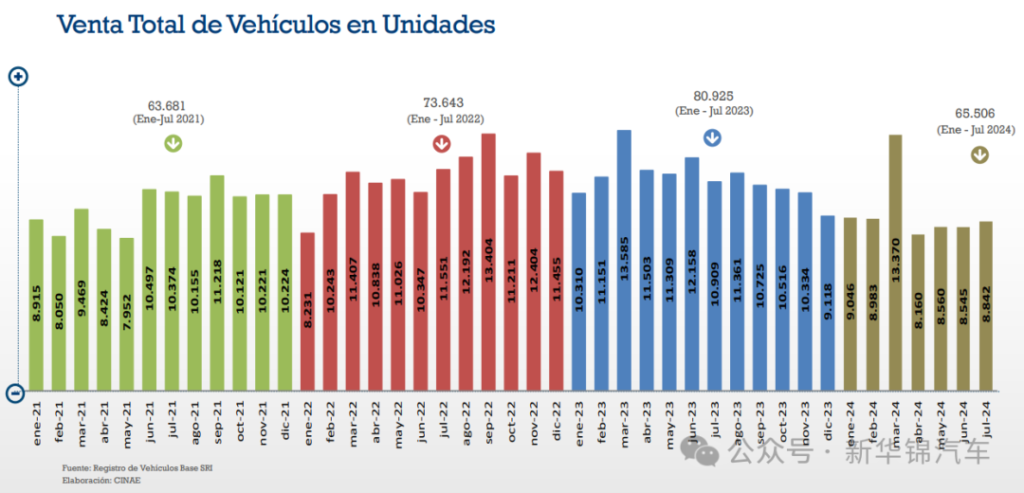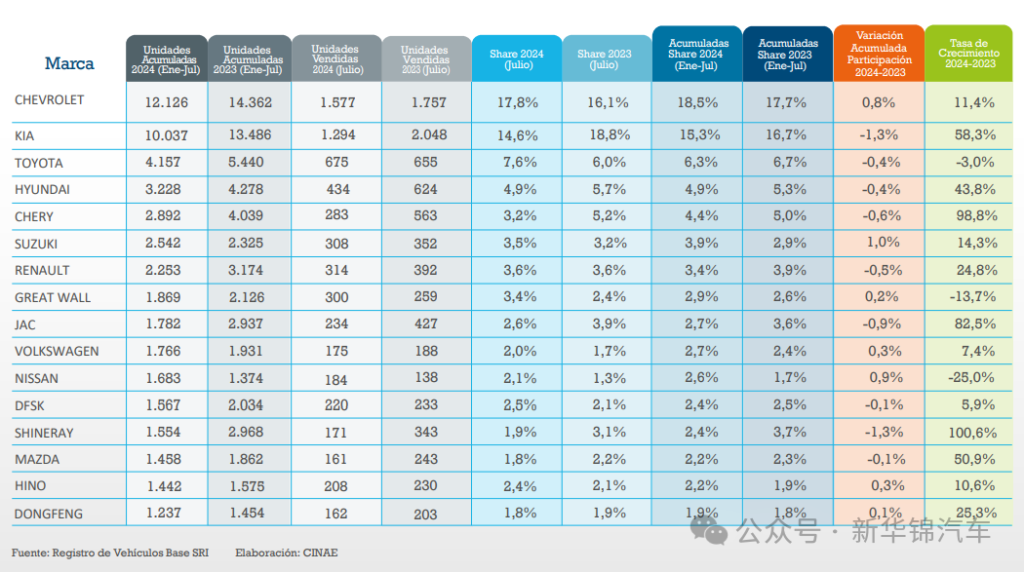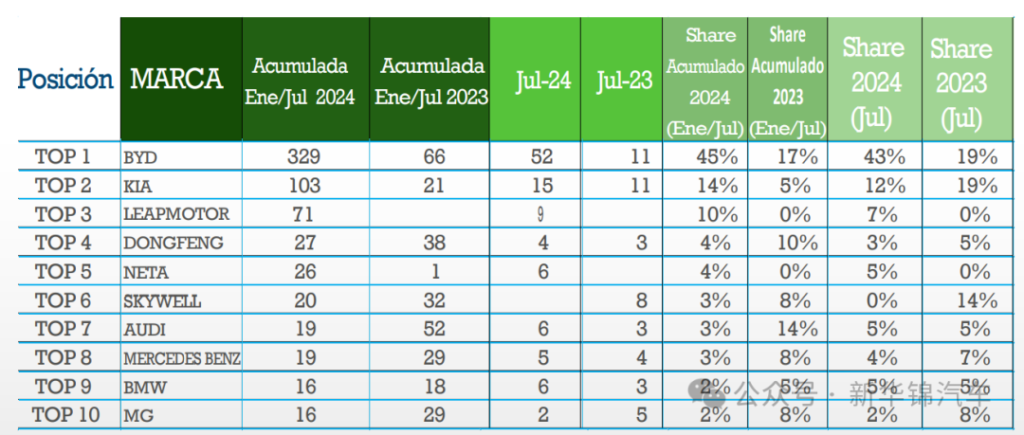
In the field of automobile exports, new vitality and opportunities are surging every week. The adjustment of domestic policies, subtle changes in the international trade environment, the expansion trend of overseas markets, the global layout of OEMs and car manufacturers, and the close linkage between upstream and downstream enterprises in the industry… every dynamic touches the nerves of the industry. Xinhua Jin Auto delves into it, carefully selecting and presenting these hot news for you, allowing you to quickly capture the latest trends in the automotive export field and easily grasp every key pulse of industry development.
Overview of this issue:
1 Geely, Chery, Jianghuai plan to set up factories in Algeria
2. General Motors closes its factory in Ecuador
We will closely monitor the dynamics of the Algerian and Ecuadorian markets and eagerly look forward to more in-depth cooperation with partners from all walks of life. If you have any business inquiries or cooperation intentions, we welcome your inquiries and cooperation at any time.
Geely, Chery, Jianghuai plan to set up factories in Algeria
According to the website of the Chinese Embassy in Algeria, the Algerian media “News” recently published a written interview with Chinese Ambassador to Algeria Li Jian. During the interview, it was mentioned that Chinese automobile companies such as Geely, Chery, and Jianghuai, as well as home appliance companies such as Hisense, Haier, and Midea, are processing investment procedures to introduce advanced technology and carry out localized production in Algeria. The products will not only be sold in Algeria, but also exported to third countries.
Geely plans to invest $200 million to build an automotive assembly plant in Algeria. The production capacity of the factory will reach 50000 cars per year. The first model to be launched in 2026 will be the GX3. Chery plans to open a factory in Bordj Bou Arreridj, Algeria in October next year. Jianghuai Automobile (represented by Emin Auto in Algeria) also plans to establish an automobile assembly plant in Ain T é mouchent Province, Algeria.
However, as of now, Chery, Geely, and Jianghuai have not obtained official licenses to produce cars in Algeria. As for whether permission has been obtained now, it is still unknown.
Algeria is a white country in North Africa, facing France, Spain, and Italy across the sea. In 2023, A lifted restrictions on automobile imports, and Chinese automobile companies such as Jianghuai, Chery, and Geely successively obtained A automobile import qualifications. In November 2022, Afghanistan will implement a new automobile policy, issuing two regulations on new car dealerships and automobile manufacturing, which stipulate that engaging in new car dealerships and vehicle production in Afghanistan must obtain approval from the Ministry of Industry and Pharmaceuticals. In March 2023, the department authorized three Algerian authorized dealers for the first time to import three brands of cars: Italian Fiat, Chinese Jianghuai, and German Opel. The 24 authorized dealers who have obtained the new car import license can import vehicles such as passenger cars, motorcycles, trucks, and agricultural vehicles, with a total of 180223 units. By the end of 2023, A will import 40000 Fiat cars (previously imported 35000) and 10000 Jianghuai cars. According to Algerian customs, since January 2024, Algeria has imported over 26000 second-hand cars, with a high proportion of cars under three years old. The customs stated that the import business of second-hand cars under three years old has significantly increased. Compared to the same period last year, the increase is about 150%. The port of Algiers alone handles the import of over 12000 used cars from abroad that are less than three years old. Imported second-hand cars that are less than three years old are considered a solution for Algerian consumers to cope with the high prices of Algerian cars.
General Motors closes its factory in Ecuador
General Motors recently announced that its factory in Quito, the capital of Ecuador, will officially cease production activities on September 6th of this year. The Quito factory, as a core force in Ecuador’s automotive manufacturing industry, has long produced over half of the country’s domestically produced cars (51%), making a significant contribution to the local economy. However, against the backdrop of intensified competition in the global automotive industry and the transition to new energy vehicles, General Motors has had to reassess its global production layout to adapt to market changes. It is reported that this shutdown plan is one of a series of measures taken by General Motors to achieve its goal of completely stopping the sale of fuel vehicles by 2035. Previously, the company had announced the closure of multiple production bases, including the Quito factory in Ecuador and a factory in Colombia, in order to concentrate resources and increase research and production efforts for electric vehicles. General Motors emphasized that although production activities will be suspended, the company’s commitment to the Ecuadorian market remains unchanged. It will continue to provide services to consumers through its existing sales network and actively explore the possibility of promoting electric vehicles in the country in the future, jointly promoting the sustainable development of the local automotive industry.
Ecuador, located in the northwest of South America, is ushering in a new chapter of economic and trade cooperation with China. With the official entry into force of the China Ecuador Free Trade Agreement on May 1st, the economic and trade cooperation between the two countries has ushered in new development opportunities. This agreement not only promotes the improvement of trade and investment quality between the two sides, but also foreshadows the further deepening of economic and trade relations between the two countries. According to the agreement, in the field of automobiles and parts, Ecuador will gradually reduce the existing import tariffs ranging from 5% to 40% to zero, which creates more favorable conditions for Chinese cars to enter the Ecuadorian market. Considering the significant advantages of Chinese cars in design and configuration, we have reason to believe that under the promotion of the free trade agreement, the competitiveness of Chinese cars in the Ecuadorian market will be further enhanced.

Imported vehicles dominate the Ecuadorian automotive market, accounting for 85% of sales from January to July 2024, while locally assembled vehicles account for 15% of sales.



(Copyright Notice: The report information is sourced from publicly available data and is intended for communication and research purposes only. If used for commercial purposes, please contact our company and the ultimate publisher before reprinting and using it.)
Hiking Auto looks forward to cooperation and win-win cooperation in going global
Qingdao Hiking Automobile Trading Co., Ltd. is one of the first pilot enterprises for second-hand car exports in China. The registered capital of the company is 133 million RMB, and it is an exclusive company established by Hiking Group to carry out the export business of second-hand cars. It belongs to the A-share listed company Shandong Hiking International Co., Ltd. (600735). The main business of the company is to integrate upstream and downstream resources of domestic and foreign automobile exports, provide one-stop supply chain supporting services throughout the entire process, and aim to build a comprehensive service platform for Chinese automobile exports to help the development of China’s automobile export industry. Hiking’s export models include fuel vehicles and new energy vehicles, covering a variety of models from major brands such as passenger cars, commercial vehicles, and construction machinery, and has established its own network channels worldwide; Export regions mainly include SCO countries and countries and regions along the the Belt and Road, and export to Japan, Belgium and other developed countries. Hiking Auto has branches in multiple countries and regions such as Japan, South Korea, and the SCO region. It has invested in CARCHS, a used car company listed on the Tokyo Stock Exchange in Japan, and has abundant overseas procurement and sales channels; At the same time, we have deepened cooperation with major automakers and second-hand car dealers in China, establishing our own vehicle source system and second-hand car export inspection standard system.

